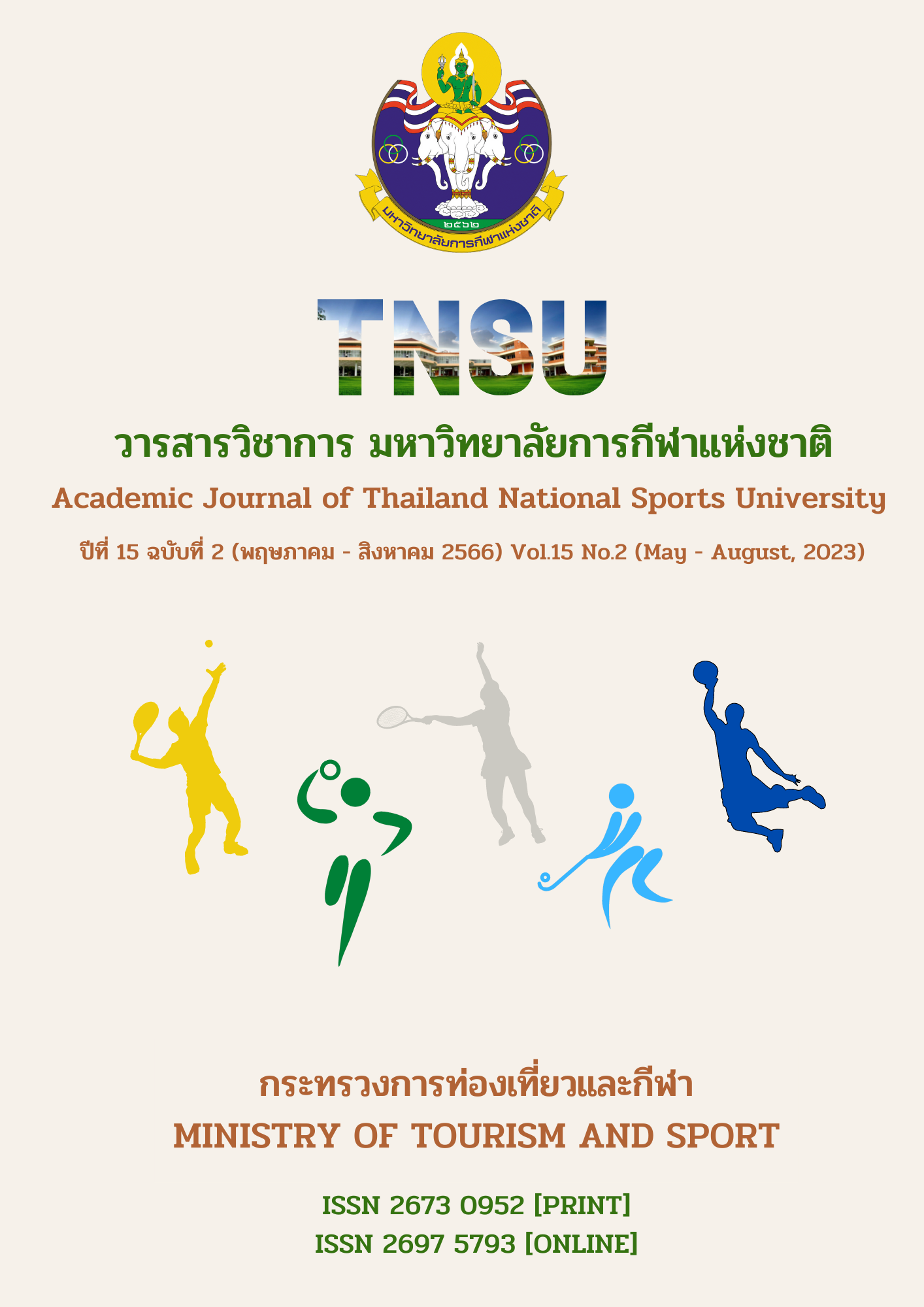PRESENTATION OF PLAY – BASED PROGRAM USING ACTIVE PLAY APPROACH AND SOCIAL MEDIA TO PROMOTE PHYSICAL LITERACY OF UPPER ELEMENTARY SCHOOL STUDENTS
Main Article Content
Abstract
The aim of this research was to present of the play - based program using an active play approach and social media to promote the physical literacy of upper elementary school students. There were four stages of research methodology: Phase I, the study of theoretical concepts used from documents, textbooks, and research related to the promotion of physical literacy; Phase II, the analysis and synthesis of the essence and components of the active play concept, and the concept of using social media and related research; Phase III, the creation of play-based program using active play approach and social media; Phase IV, the quality check of the created program by 5 experts to study the index of congruence. The results of the research were as follows: 1) The play-based program using active play approach and social media to promote physical literacy of upper elementary school students which consisted of 8 activities, namely: (1) fun running activity, heart happiness (2) Fun jumping activity to build leg power together (3) Tennis ball pick-up activity (4) Tennis ball throwing activity to achieve goal (5) Monkey ladder activity running fast (6) Jumping, dancing, strong muscles (7) Dribbling activity the soccer ball increases speed and (8) Touches the balance soccer ball. 2) Each activity consists of the activity name, objectives, and steps to perform the activity. 3) The duration of the program was 8 weeks, 2 days each, 80 minutes each, and 4) the play-based program used active play approach and social media to promote physical literacy of upper elementary school students, which had an index of congruence of 0.9.
Article Details

This work is licensed under a Creative Commons Attribution-NonCommercial-NoDerivatives 4.0 International License.
The published article is a copyright of the Academic Journal of Thailand National Sports University. The passage appeared in each article in this academic journal is a perspective of each author which is not related to the journal. Each author is required to be responsible for all components of his/her own article. If there are any mistakes, each author must be responsible for those mistakes on his/her own.
References
Active Healthy Kids Global Alliance. (2018). The global matrix 3.0 on physical activity for child and youth. Retrieved from https://www.activehealthykids.org/global-matrix/3-0/
Arkorn Pramong, Ann Mahakeeta, Sumonratree Nimnatipun, & Yodchanan Wongsawat. (2020). Development of play activity model for the learning enhancement of sixth grade student in school under the department of education Bangkok. Journal of Social Science and Buddhistic Anthropology, 5(9), 139 - 158.
Arunee Boonyanukul. (2019). Results of analytical thinking skills development using lanna traditional games in “Moderate Class, More Knowledge” activities provision for prathomsuksa 3 students. Journal of MCU Buddhapanya, 4(2), 238 - 252.
Bopp, T., & Stellefson, T. (2020). Practical and ethical considerations for schools using social media to promote physical literacy in youth. Int. J. Environ. Res. Public Health, 17(4), Retrieved from https://doi.org/10.3390/ijerph17041225
British Heart Foundation. (2015). Physical Activity in the Early Years: Evidence Briefing. Loughborough University: British Heart Foundation National Centre (BHFNC) for Physical Activity and Health.
Chetchatri Nolkhom, & Yotsawee Saifah. (2020). Effect of using social media activities package based on phenomenon - based learning and reflective thinking on digital literacy behavior for primary school students. Silpakorn Educational Research Journal, 12(2), 71 - 89.
Clark, D. (2019). Active play experiences help young children develop physical literacy. Retrieved from https://activeforlife.com/active-play-develops-physical-literacy/
Guerrero, M. D., Hoffmann, M. D., & Munroe - Chandler, K. J. (2016). Children’s active play imagery and its association with personal and social skills and self - confidence. Journal of Imagery Research in Sport and Physical Activity, 11(1), 47 - 57.
Jintana Sarayuthpitak, Sarinya Rodpipat, Sanong Ekgasit, & Dean M. Ravizza. (2021). Effectiveness of oral hygiene promoting program for elementary school students using a smartphone endomicroscope in Thailand. Journal of Health Research, 35(5). doi: 10.1108/JHR-12-2020-0657.
Johnstone, A., Hughes, A. R., & Reilly, J. J. (2019). Utilizing active play in schools to improve physical activity and fundamental movement skills in Scottish children. Scottish Educational Review, 51(2), 29 - 39.
Karakada Nugkim, & Noppawan Kaneungchaisakul. (2020). Using social media - material for learning in child phycology in school. Journal of Industrial Utilising Education, 19(2), 1 - 11.
Kemp, S. (2020). Digital 2020: Thailand. [Datareportal]. Retrieved from https://datareportal.com/ reports/digital-2020-thailand
McGarty, A., Jones, N., Rutherford, K., Westrop, S., Sutherland, L., Jahoda, A., & Melville, C. (2021). Feasibility of the Go2Play Active Play intervention for increasing physical and social development in children with intellectual disabilities. Pilot and Feasibility Studies, 7(43), 1 - 9. Retrieved from https://doi.org/10.1186/s40814-021-00783-6
Moghaddaszadeh, A., & Belcastro. A. N. (2021). Guided Active Play Promotes Physical Activity and Improves Fundamental Motor Skills for School - Aged Children. J Sports Sci Med, 20(1), 86 – 93.
Natsariya Chaksomsak, Jintana Sarayuthpitak, & Shotiga Pasiphol. (2021). Development of University Student Happiness Enhancement Program. Academic Journal of Thailand National Sports University, 13(1), 200 - 214.
Office of the Royal Society. (2019). Dictionary of Contemporary Academic Terms a Set of Literacy. Moral and Political Sciences Division.
Roach, L., & Keats, M. (2018). Skill - based and planned active play versus free - play effects on fundamental movement skills in preschoolers. SAGE Journals, 125(4), 651 - 668.
Sirima Somton, Yupin Aungsuroch, & Sunisa Suktrakul. (2019). The effect of psycho - education combined with social media program on symptom severity of persons with bipolar disorder. Journal of The Royal Thai Army Nurses, 20(1), 252 - 260.
Thai Health. (2019). Active Play 60 minutes stimulate the brain to create learning according to age. Retrieved from https://www.thaihealth.or.th/Content/48681
Thai Health & TCDC. (2018). Active Play Innovation. Retrieved from https://www.tcdc.or.th/ search?keyword=ebook-ActivePlay&tab=ebook
Whitehead, M. (2011). Physical Literacy Throughout the Lifecourse. Routledge.


